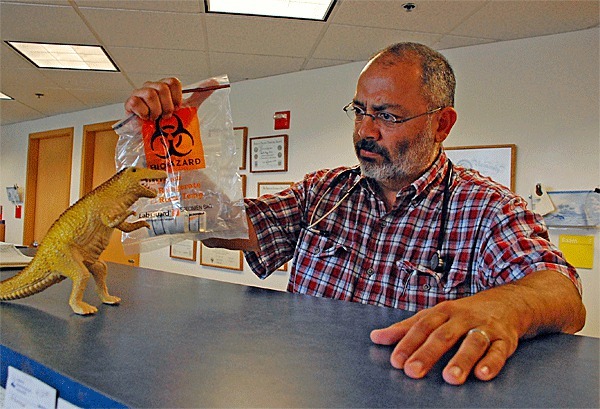When asked to pose for a picture that would accompany a story about his recent national recognition by the Commission on Cancer, Oak Harbor pediatrician Gabe Barrio did what came naturally.
He pretended to feed skin biopsies to a toy dinosaur.
To anyone who knows him, that wouldn’t come as much of a surprise. Whether he’s crunching cancer statistics for Whidbey General Hospital, seeing children at his pediatric clinic, or just trying to get a grin out of a reporter, Barrio’s mission is the same: to make a difference by making people feel better.
Even after 18 years of pediatrics and medicine, patching up countless skinned knees, mending hundreds of broken bones, and seeing to who knows how many coughs, it never gets old.
“It’s like a custom made job for me,” he said.
And he’s good at it, too. His skills and knowledge have earned him the seat as chief of medicine for the hospital for the past three years. He is also serves as the hospital’s physician liaison for the American Cancer Society, a position for which he is receiving national recognition.
The American College of Surgeons’ Commissioner on Cancer has awarded Barrio the Outstanding Physician Liaison Award. He was one of just 39 such liaisons from across the country, out of a pool of about 1,600, to receive the honor for their work in 2009, according to commission spokesman Cory Petty.
While each liaison should receive their award in the mail soon, they will also be officially recognized this October at the college’s clinical congress in Washington, D.C.
Whidbey General Hospital is one of about 1,400 hospitals in the U.S. to have an accredited cancer program. And according to Renee Yanke, program manager and director of the hospital’s MAC oncology clinic, it’s not all that common for the liaison position to be filled by a pediatrician but Barrio’s performance has been more than noteworthy.
“He’s really stepped up to the plate and done a marvelous job,” she said.
Barrio’s position is multi-faceted, from being a guest speaker at public events to making presentations that compare cancer statistics from the hospital and the National Cancer Data Bank, a database utilized by cancer related organizations across the country.
According to Yanke, Barrio has not only brought his personal enthusiasm to the job but has done everything requested of him. In a moment of uncharacteristic seriousness, Barrio said his willingness to serve and strong work ethic was something passed down by his father. Even if you don’t like something, you do your best. But working hard at the liaison position has been easy, he said.
“I do it because it’s fun and cool,” Barrio said.
But he also said the hospital is filled with staff just like himself. Indeed, Whidbey General Hospital was recently recognized by the state’s Rural Healthcare Quality Network, a partnership group composed of critical access hospitals throughout Washington, with five awards for quality improvement.
Teresa Fulton, the hospital’s director of quality and patient safety, said it was great to be publicly recognized because most of the awards apply to work done “behind the scenes.” While it may be invisible to the public eye, its important nonetheless, she said.
“It definitely impacts care and saves lives,” Fulton said.
The hospital took home awards for adopting standardized protocols for ST segment elevation myocardial infarctions, a type of heart attack; best practice awards for the adoption of labor induction guidelines for obstetrician care, public reporting, and for follow-up care for discharged heart failure patients; and finally for superb information sharing with other network members.
Barrio said he is grateful for the honor bestowed on him, but as the hospital’s awards indicate, he is just one many doctors and staff at Whidbey General who deserve recognition.
“My award is our team’s award,” Barrio said.


